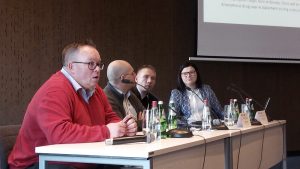The Open Society Foundations convened civil society activists from HIV, harm reduction, sex worker and LGBT communities from South Eastern Europe and health and human rights donors to discuss opportunities for strategic collaboration to sustain HIV prevention services for key populations and facilitate transition to domestic financing of these programs. The half-day meeting was held on 18 January 2018 in Belgrade, Serbia.
The aims of the meeting were:
- Share examples of civil society advocacy towards domestic financing of HIV services, including efforts to push national governments to commit to provision and financing of services for key populations;
- Discuss current challenges sustaining programming for key populations in the region with a specific focus on the threats to the human rights movements, programs, and advocates that were directly and indirectly supported by the Global Fund when it was still active in the region;
- Present examples of how targeted donor support for civil society engagement in transition and sustainability process can bolster government ownership of the HIV response;
- Discuss strategies and opportunities to address the service gap and enable civil society to navigate the transition process, as well as roles that donors, regional networks and technical agencies can play.
DPNSEE member organisations representatives were panellists: Denis from Margina and Dragos from RHRN presenting situation in Bosnia Herzegovina and Romania, Ivana from Juventas presenting the promising case study of Montenegro and Milutin, together with two other networks (ERA – LGBTI Equal Rights Association for Western Balkans and Turkey and SWAN – Sex Workers’ Rights Advocacy Network) on possibilities for work together to strengthen national and regional advocacy.
Many organisations were at the list of potential invitees. Finally, around 35 CSO participated. Besides DPNSEE, 9 member organisations were present: Aksion Plus, Margina, Viktorija, Labyrinth, Cazas, Juventas, ARAS, RHRN and Prevent.
The meeting was mainly about presenting situation and needs, with not many questions and comments from the floor. Most of the results were achieved in informal exchanges with other participants. Besides OSF and Global Fund representatives, donors included Embassy of France in Serbia, Mama Cash and Reconstruction Women’s Fund (Serbia). Representatives of other Networks included Eurasian Harm Reduction Network and Eurasian coalition on male Health.
Just after the main meeting of the dialogue, an Informal dialogue on LGBTI and HIV in South-Eastern Europe was organised by the ERA – LGBTI Equal Rights Association for Western Balkans and Turkey. Most of the DPNSEE member organisations participated in the meeting that addressed the current work done, gaps and challenges in collaborating towards protecting LGBTI rights and addressing HIV and needs and opportunities for a regional approach and support of this work.


